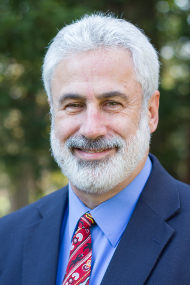Dr. Green RetiresJune 05, 2014
The Board of Trustees and administration wish to announce the retirement of Dr. Douglas J. Green, Professor of Old Testament and Biblical Theology, beginning October 1, 2015. Dr. Green’s honorable retirement follows a recent decision by the Trustees. In December 2009 the Board of Trustees accepted Dr. Douglas Green’s endorsement of the “Affirmations and Denials” and regarded his written statement “as containing acceptable clarifications and allowable exceptions”. However, at the November 2013 meeting of the Board the previous 2009 action was amended. Dr. Green’s response to Section IV of the “Affirmations and Denials” is no longer acceptable. The Board of Trustees regards the particular hermeneutical method of the New Testament use of the Old Testament included in Dr. Green’s response to be inconsistent with the Seminary’s confessional standards. While Dr. Green respectfully disagrees with this decision of the Board, he acknowledges the governing authority of the Trustees to lead Westminster in fulfilling the institution’s mission as a confessional Reformed seminary. We thank Dr. Green for twenty-two years of exemplary service as a member of the faculty. His contributions to the life of the seminary and especially his devotion to the students demonstrate his exceptional commitment as a teacher and mentor. We wish Dr. Green well in his future endeavors to serve the Lord. Questions and Answers from Westminster and Dr. GreenWhat is the background to the announcement of Dr. Green’s retirement? In November 2013, the Board reviewed and amended its 2009 decision concerning Dr. Green’s statement on the “Affirmations and Denials,” specifically with reference to his comments on Section IV (“Original Meaning and NT Meaning of OT Texts”). With respect to this section of Dr. Green’s 2009 statement, the Board concluded that he had expressed agreement with a “christotelic” hermeneutical method that severs the organic link between the Old Testament and the New Testament and that in the Board’s determination this view is inconsistent with the teaching of Scripture found in the Westminster Standards. After the Board’s November 2013 decision, in the context of a potential further investigation of his hermeneutical approach, Dr. Green was given the opportunity to modify his 2009 statement and to revise and republish his 2010 article on Psalm 23 . Dr. Green declined to make these modifications. Subsequently, he and the Seminary have reached an amicable agreement which will allow him to retire honorably at the end of September 2015. Where can I find more information about both Dr. Green’s and Westminster’s hermeneutical approaches?
The following article & lecture are representative of the hermeneutical approaches taught at Westminster:
Is Dr. Green’s position heretical? Why has Dr. Green’s church and/or denomination not been involved in this decision? What is Dr. Green’s response to the Board’s November 2013 motion? |






